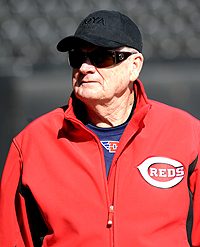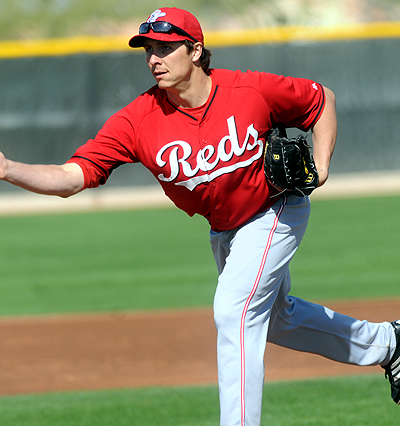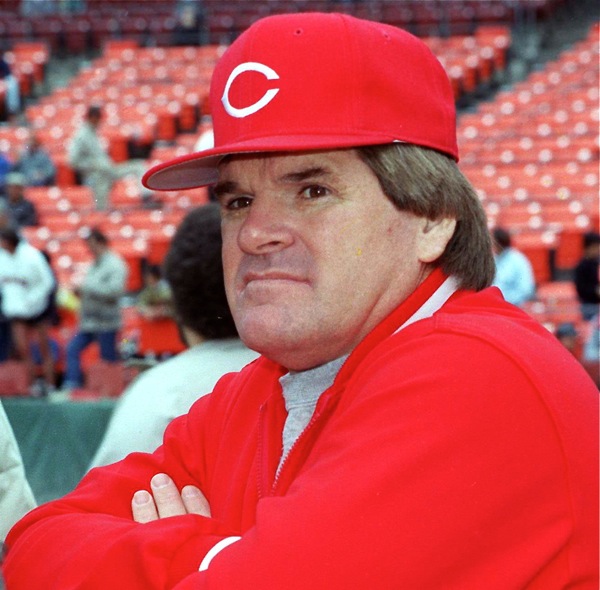New questions for Hal McCoy on the Reds, and why no one bunts…comparing bad Reds now to bad Reds past…shouldn’t the baseballs be switched…and why to they even play baseball in Florida?
 From Dave in Beavercreek taking selfies at breakfast, lunch and dinner at restaurants of which you never realized existed: Can Pete Rose’s new book tell us anything we don’t already know about his life and career?
From Dave in Beavercreek taking selfies at breakfast, lunch and dinner at restaurants of which you never realized existed: Can Pete Rose’s new book tell us anything we don’t already know about his life and career?
DAVE: I love his line a few years ago after his first book: “I wrote a book before I ever read one.” I would bet (word usage intended) that Rose still hasn’t read a book. And he hasn’t written one, either. All his books were written by somebody else after they spent hours and hours interviewing him and transferring and translating it into a manuscript that is sensible and usable. I pretty much take with a grain of salt what is put in his books. In his confessional book, “Prison Without Bars,” he said I told broadcaster Tony Kubek and baseball writer Jack Lang that he bet $50,000 on a World Series game. Not only did I not say that, I never ever discussed Rose’s gambling habits with Kubek or Lang.
From Rick McCann: First-time writer to this website. Very impressed with the content and the list of contributors. I wonder if it’s as frustrating for you to watch the Reds hit as it is for others who know something about baseball. The defense has four (or sometimes five) infielders scattered in a shift 150 feet away from home plate, and player after player goes up there swinging away hitting into the shift. I wonder when the last time you, Hal McCoy, saw a Reds player purposely put down a bunt just to get on base?
RICK: As far as I can remember, it goes back to April when I recall Jesse Winker dropped a bunt for a hit. Like you and other baseball enthusiasts, it just boggles my mind that players don’t try to beat the shift with bunts. If not that, why not hit the ball the other way. We saw that in the recent series against the Chicago Cubs. Left handed first baseman Anthony Rizzo had seven hits in the three-game series, all seven the opposite way into left field. That’s the way to beat the shift. Unfortunately, under today’s analytics, the home run rules. It is exit velocity and launch angle, blah, blah, blah. It is home run or nothing. Teams are no longer interested in putting big numbers on the board in an inning, unless it is a three-run home run or a grand slam. And that’s a shame. I remember Ken Griffey Jr. telling me, when teams shifted against him, “They can’t put a defender in the right field seats. And that’s the attitude these days.
From Don in Vandalia: I read so much about the baseball’s being livelier and wonder if it shouldn’t be switched to where the pros get a ball that isn’t juiced, and the amateur leagues get the ball that travels farther? I recently watched my grandson play (15 years old) and neither team could hit the ball beyond 200 feet. Or, does this make too much sense?
DON: I don’t know about different baseballs. I’m sure amateur baseballs are not as delicately made as MLB balls. And 15-year-olds don’t hit the ball as hard as major leaguers. I have no doubt in my mind that the baseballs are slicker, wound tighter, have lower stitches to cut down wind velocity and are as hard as cue balls. That is obviously what MLB wants, but it sure makes the game boring. When you watch MLB TV and the show the highlights all you see are home run, home run, home run, grand slam home run. It is Home Run Derby nearly every game. Stolen bases, hit-and-runs and move the runners over are ancient history.
From Gary in New Bremen: I saw the play this week where the Angels’ catcher got run over at home plate while trying to tag out a runner from the Astros. Afterwards, the commentators talked about there are different rules for blocking the plate – sometimes it’s allowed, and sometimes it isn’t? Why? And how are the players supposed to know how to play?
GARY: The commentators were dead wrong. I didn’t hear what they said, but if they said there are different rules, they are reading a different rule book than I read. The rule is simple. The catcher may not block the plate when he is awaiting a throw. He must make the catch without blocking home plate and make the tag. However, if the throw takes him up the third base line in the base path, he may move there to make the catch. If he is blocking the plate after making the catch, then it is OK. He cannot block the plate before catching the throw. Simple as that, and all the players, managers and coaches know it. Apparently some broadcasters don’t know it. They’re too busy name-dropping or discussing what restaurant they will frequent that night.
From Tom in Columbus: Hal, I’m rapidly approaching baseball burnout and I see where the NBA is considering shortening their schedule by twelve games, if they can find a way to replace the lost revenue from those games. Isn’t it time that baseball think about playing fewer games, too?
TOM: It has been talked about, but only talk. Owners do not want to lose revenue and I don’t see how the NBA can cut 12 games and find the revenue to replace those games. Other than lost revenue, it would make sense to trim the schedule. It is too cold in late March and early April is most venues, so I’d move the season ahead a couple of weeks. And I’d end the regular season on September 1. Not only does it get cold in some cities in September, there is also too much competition for baseball in September with the NFL, NBA and NHL. But it makes too much sense. It would also wreak havoc on the sacred record books.
From David Waller: I thank, and compliment you for taking the time to interact with baseball fans on Press Pros. Very interesting. My question is…given the fact that the Reds have finished last for the past four seasons, can you compare this team to a different time when they were equally bad, like the Dick Wagner era?

While the Dick Wagner era was not good, the current era of Reds baseball is the worst – bad signings (Homer Bailey, above) and trades that just haven’t worked out have led to four consecutive last-place finishes.
DAVID: Thanks. It is my pleasure. I always enjoy interacting with fans, even more so than interacting with the players. While the Dick Wagner era was not good, they lost 101 games in 1982, the most the franchise ever lost. But in my 46 years of covering the team, the current era is the worst — four straight last-place finishes with the possibility of five straight. I got spoiled in my first years of covering the team — The Big Red Machine era. I thought it would always be this way. It wasn’t. Not even close and the BRM era (Big Red Machine) will never happen again. I’ve seen the other side and it isn’t pretty.
From Mark Decker: I watched the Rays and Yankees play this week and noticed there was no one in the ballpark at St. Pete. The announcers made the statement that the team in Miami has struggled to draw fans, as well, even while winning the World Series. So why did they put teams in Florida in the first place?
MARK: Great question and it is one I’ve wondered about. The old Florida Marlins twice won the World Series and then had fire sales the next year because they couldn’t afford the salaries because the stands were empty. They have no excuse now because they have a beautiful new ball park that should draw fans. Not the same in Tampa Bay. They have good teams every years, but they play in a dump. They should have a better stadium and they should play in Tampa (a large city) instead of in St. Petersburg (a mid-size town). They have tried to build a new stadium in Tampa, but the citizenry voted it down. Not only that, but there are so many things to do in Florida — beach, golf, fishing. They are talking about playing half of Tampa’s home games in Montreal. Wouldn’t surprise me to see Tampa Bay lose the team.
From Matt DeWitt: I know you are an Indians fan and wondered if you were a fan of the other Hal (Lebovitz) when he used to write their games? Was he an influence on your own career?
MATT: Indeed, I was attending Kent State University’s School of Journalism and reading The Other Hal in the Cleveland Plain Dealer. But I was more influenced by the baseball writer in my hometown newspaper, The Akron Beacon Journal. The writer was a crusty guy named Jim Schlemmer. He really tore into players in his stories when they lost, and the Indians lost often in those days. Lebowitz also wrote an ‘Ask Hal’ column, as I do. But I didn’t copy. He was also an umpire and basketball official and a football referee. His column was more about rules. I got to know him personally when I became a baseball writer and covered inter-league games in Cleveland. He had retired from The Plain Dealer, but he still wrote a column for a suburban daily. He was in his 90s and still attending games and writing columns and collecting scoops because he knew everybody in Cleveland. Quite a guy.

"I love his line a few years ago after his first book: 'I wrote a book before I ever read one.' I would bet (word usage intended) that Rose still hasn't read a book." - Hal McCoy (Press Pros Feature Photos)


